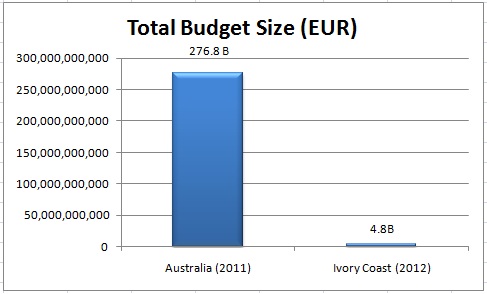Reality Check
Looking at the Ivorian government budget, I thought it would interesting to compare it to a developed country. To avoid adjusting for population size, I checked if there were any developed countries with about the same population as the Ivory Coast:
Turns out Australia at 22.9 million comes very close. The latest available budget for Australia is for 2010-2011 (the one for 2012-2013 is published tomorrow) and the total budget size is 356 billion aussie dollar which, using the current AUD/EUR exchange rate, is equivalent to 276.8 billion euro.
The 2012 budget for the Ivory Coast on the other hand comes in at 3.16 trillion CFA Franc which is 4.8 billion euro. That makes the Australian budget 57 times greater than Ivory Coast’s.
So there we have it, while the gap between the developed and developing world is narrowing, especially for indicators such as life expectancy or child mortality, there is still a pretty big gap in economic terms, at least for Sub-Saharan Africa.
I kind of like budget figures, because they are much more precise than GDP. I looked at GDP as well, and I would have expected a smaller gap there as tax collection in the Ivory Coast captures a smaller part of the economy than in Australia leading to a smaller budget. However, the Australia – Ivory Coast GDP gap using IMF figures turned out to be about the same as the budget gap. Explanations could be that I’m only looking at the federal level in Australia – not including regions, that Ivory Coast’s budget is augmented by support from international bodies and/or that Ivory Coast’s GDP is underestimated.
Receipts and Expenses
Looking at tax receipts, Australia took in 302 B AUD (234.8B EUR) in 2011, whereas the Ivory Coast budgets to bring in 1949 B CFA Franc (2.97 B EUR) in 2012. That makes Australia’s receipts 79 times greater.
Here’s where the receipts (largest categories) came from:
The thing is income tax, company tax and VAT only touch the formal economy in the Ivory Coast, whereas everybody have to pay import and export duties. With time I would expect Ivorian receipts starting to look more like the Australian.
Now for expenses (largest categories):
Australia’s profile is pretty typical for a modern western liberal democracy, with the welfare sector dominating expenses. First I didn’t find anything at all resembling social security in the Ivorian budget, but at the end there was a small “Affaires sociales” post with contributions to orphans, social centers, war victims, but most of it to administration.
Going back 100-200 years the budgets of western countries looked more like present day Ivory Coast than Australia. (See US historical budgets in the Customs post.) What’s remarkable about the Ivory Coast budget, and sets it apart from 19th century US budgets, are the investments – in among other things the third bridge over the Abidjan lagoon. Despite the Australian budget being 57 times greater, Ivory Coast’s investments are actually comparable to the Australian ones in absolute numbers. And that should be a good sign for the future!




